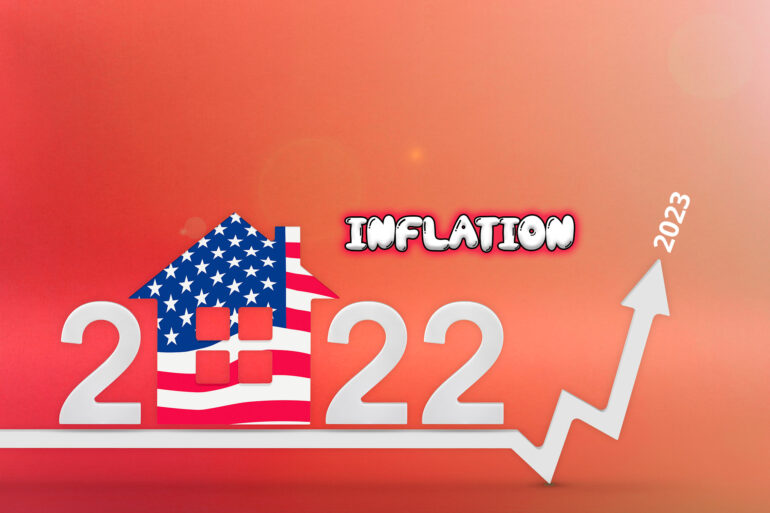What Is the Effect of Inflation on Housing Prices?
Inflation is rising rapidly. According to the U.S. Bureau of Labor Statistics, the June 2022 U.S. inflation rate reached 9.1%, which is the highest it’s been since 1981!
If rising inflation has you worried about the housing market, you’re not alone. In times like these, many are concerned about the value of their current (and future) investments.
Though it’s impossible to predict exactly how inflation will impact housing prices, this article will cover everything you need to know to be prepared for the worst.
We’ll go over the relationship between inflation and housing prices, the history of U.S. recessions since 1970 (and how they impacted home values), and the current outlook of the U.S. real estate market.
Let’s get started!
Relationship Between Inflation and Housing Prices
To understand how inflation impacts housing prices, you first need to understand what inflation is.
Inflation refers to a general increase in prices (and a correlated fall in the purchasing value of money). It’s usually caused by changes in the supply and demand of goods, services, or money itself.
Inflation is measured by the Consumer Price Index (CPI), which tracks changes over time in the prices paid for a set basket of goods and services (including food and drink, housing, apparel, transportation, medical care, recreation, education, and communication).
In and of itself, inflation is not bad. In fact, many economists consider an inflation rate of 2% per year to be healthy because it helps drive economic growth.
However, inflation rates above 2% per year tend to hurt the economy. That’s because, unless wages rise with inflation, people can buy less with their money. This is what is happening with gas prices, for example, which recently topped an all-time national high of $5.
The real question is, will the same happen to house prices? All else being equal, housing prices do tend to rise with inflation (just as any good with limited supply does).
For real estate investors, this could be good news. It means the value of their properties will go up. At the same time, one of the first things the federal government does to fight inflation is raise its federal funds rate, which basically sets the foundation for all interest rates, including mortgage rates.
And when mortgage rates go up, buying real estate becomes less affordable, so fewer people do it. The resulting drop in demand for buying real estate then leads to lower home prices.
Basically, inflation can make home prices go up or down. A lot depends on how the government chooses to respond to it. To gain deeper insight on how inflation impacts home prices, let’s take a look at past recessions.
History of U.S. Recessions Since 1970
As a rule, inflation tends to lower an economy’s overall consumption (i.e., when stuff gets more expensive, fewer people buy). This can often trigger a recession, a temporary decline in economic activity defined as two consecutive quarters of falling GDP.
Here’s a brief overview of U.S. recessions since 1970 and how they impacted home prices.
Recession of 1973-75
The recession of 1973-75 was the first major economic downturn since the Great Depression. It was caused by many factors, including the OPEC oil embargo, the fall of the Bretton Woods system (i.e., the gold standard), wage and price controls under President Nixon, and a steel crisis.
The recession lasted for 16 months and experienced what’s called “stagflation,” a unique combination of high inflation rates with high unemployment rates. During this period, housing prices shot up by 11.7%.
Recessions of 1980 and 1981-82
The recessions of 1980 and 1981-82 were so close together that they are often referred to as a double-dip recession. Accommodative monetary policy aimed at alleviating rising unemployment triggered the recession, and within six months, interest rates went from 10.5% to 17.5% and then back down to 9.5%.
The 1979 Iranian oil embargo only aggravated conditions, leading to another 16-month downturn in which housing prices rose by 1.9%.
Recession of 1990-91
The recession of 1990-91 was a relatively mild recession caused by the savings and loan crisis, Iraq’s invasion of Kuwait, and the resulting 1990 oil shock and Gulf War. It lasted nine months and had little impact on the housing market, though real home prices fell by as much as 7% in some parts of the country.
Recession of 2001
The recession of 2001 followed the collapse of the dot-com bubble, in which investors overvalued internet startups. The 9/11 attacks made the recession even worse. After initially raising the federal funds rate, the Fed started cutting it until it reached a low of 1% by mid-2003.
During this time, house prices increased by 4.8% due to low mortgage rates and a deregulated mortgage market, and new home sales climbed to an all-time high.
Recession of 2007-09
The recession of 2007-09 was the worst recession in U.S. history, which is why it’s also known as the Great Recession. A sharp increase in subprime mortgages that went into default caused the economy to collapse.
Home prices declined by 18% within six months, and in some areas like Las Vegas, they dropped by as much as 62%! Many homeowners were faced with underwater mortgages and were forced to foreclose.
What can history teach us? On the one hand, recessions often prompt the Federal Reserve to lower interest rates, which leads to more affordable mortgage rates, increased housing demand, and rising home prices.
On the other hand, some recessions are caused by inflation bubbles that are followed by a quick decrease in home value once the bubble bursts.
Although it’s hard to say for sure what will happen to home prices in a recession, most of the time they go up.
Current Outlook for the U.S. Housing Market
Fortunately, today’s mortgage lending standards are much stricter than they were in 2007. A new recession is unlikely to be the result of a mortgage bubble.
Right now, home prices continue to rise despite inflation and a possible recession on the horizon. A housing shortage and low mortgage rates continue to fuel rising home prices (though that could change with recent hikes in the federal interest rate).
Ultimately, there’s no perfect time to buy a house, and past recessions don’t guarantee how future ones will go. If you want to invest in a hot real estate market, check out PropertyOnion.com’s free property search tool today!








